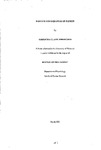POSTIVE CONSEQUENCES OF ILLNESS
| dc.contributor.author | SODERGREN, SAMANTHA CLAIRE | |
| dc.contributor.other | School of Psychology | en_US |
| dc.date.accessioned | 2013-11-14T10:01:27Z | |
| dc.date.available | 2013-11-14T10:01:27Z | |
| dc.date.issued | 2002 | |
| dc.identifier | NOT AVAILABLE | en_US |
| dc.identifier.uri | http://hdl.handle.net/10026.1/2700 | |
| dc.description.abstract |
This thesis identifies systematically the domains of positive consequences of illness and details the development of a measure of the positive consequences of illness- the Silver Lining Questionnaire (SLQ). Further aims of the thesis include the use of the SLQ as a predictor of health outcome and an investigation of the prevalence and correlates of positivity in illness. The first study questioned 55 people about their positive experiences of illness and uncovered 17 themes. In the second study a pilot questionnaire based on these themes was administered to the participants of the first study and an additional sample of cancer and chronic respiratory patients. Refinements to the questionnaire resulted in a 38-item measure of positivity. In study 3, the SLQ's properties of reliability and responsiveness to change were confirmed in a sample of chronic respiratory and cardiac patients in a rehabilitation setting. This study also found that positivity increased following rehabilitation. In study 4, the SLQ was used to predict the health outcome of patients with chronic fatigue syndrome. Finally, study 5, investigated the prevalence of positivity amongst respiratory patients varying in illness severity and found no significant difference between patient groups in the expression of positivity. This study identified extraversion and a sense of spirituality and religiosity as correlates of positivity. This thesis thus addresses a previously neglected field of research and presents a more comprehensive measure of positivity than existing measures. This thesis also addresses previously unanswered questions regarding the prevalence and correlates of positivity and also the potential for increasing positivity. Finally, the implications of positivity in illness for health management are highlighted. | en_US |
| dc.language.iso | en | en_US |
| dc.publisher | University of Plymouth | en_US |
| dc.title | POSTIVE CONSEQUENCES OF ILLNESS | en_US |
| dc.type | Thesis | en_US |
| plymouth.version | Full version | en_US |
| dc.identifier.doi | http://dx.doi.org/10.24382/1394 | |
| dc.identifier.doi | http://dx.doi.org/10.24382/1394 |
Files in this item
This item appears in the following Collection(s)
-
01 Research Theses Main Collection
Research Theses Main


